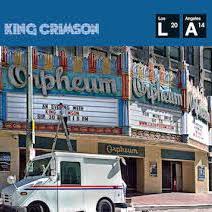This month sees King Crimson enter their 47th year of existence. Glance at the live ads in the mainstream music media, and you’ll see that what was once the nostalgia circuit now makes up a sizeable proportion of all available gigs. As rock enters its autumn years, the refusal of the old guard to retire gracefully has all kinds of implications for modern music, psychologically as well as practically. But are King Crimson part of the problem? On the evidence of Live At The Orpheum, KC still sound like they’re transmitting from a future we haven’t reached yet, which frankly renders the question null.
However, given Robert Fripp’s announcement of his <a href="http://www.ft.com/cms/s/2/f588e100-d7ee-11e1-9980-00144feabdc0.html#ixzz25mEnRslA" tagret=out">retirement from the music business in 2012, it’s surprising they’re here at all. It wasn’t the first time that Fripp had declared creative burn-out, but the circumstances on this occasion were different: his long-running battle with Universal Music Group over rights and money had led him to describe participation in the industry as "a joyless exercise in futility". So what changed? Well, it looks like he won (for instance, there’s barely a trace of King Crimson on streaming services such as Spotify), but the happiness that ensued didn’t sit well with the notoriously ‘difficult’ Fripp. And so KC were reconvened once again, with Live At The Orpheum culled from two shows played in Los Angeles during a short US tour at the end of last year.
The machinations of the music business clearly remain uppermost in Fripp’s mind though. The small print on the back of the CD reads: "The phonographic copyright in these performances is operated by Discipline Global Mobile (Fripp’s label) on behalf of the artists, with whom it resides, contrary to common practice in the record industry. Discipline accepts no reason for artists to assign the copyright interests in their work to either record company or management by virtue of a "common practice" which was always questionable, often improper, and is now indefensible." It sounds like Fripp is also on the side of the angels in the loudness wars, as this is the most quietly mastered CD I’ve ever heard.
Played live for the first time on this tour, the lurching, bottom-heavy riff of ‘One More Red Nightmare’ sounds positively demonic, like the devil pimp rolling along some seedy, neon-lit broadwalk. Returning saxophonist Mel Collins (whose initial tenure with the band was in the early 70s) ghosts the guitar and bass lines to create a menacing swing time feel, while the song’s clipped funk breakdowns showcase his freewheeling but melodic soloing. An intriguing feature of the latest KC configuration is its three drummer ‘frontline’ (including new recruit Bill Rieflin, ex-Ministry and Nine Inch Nails), who have fun interpreting the cacophonous percussive clatter of the original version (though Bill Bruford must be smiling to himself that it takes three people to reproduce what he did on his own). ‘…Nightmare’ is one of KC’s most direct songs, and its reanimation here makes you wonder what direction the band might have taken if they hadn’t imploded (for the first time) just before the release of its parent album Red in 1974.
‘Banshee Legs Bell Hassle’ is an ambient percussion interlude that recalls the start of ‘Larks’ Tongues In Aspic Part 1′ and leads into ‘The ConstruKcution Of Light’, a track from the band’s turn of the century incarnation. Like a shadowy Penguin Café Orchestra, it’s a subtly tense cat’s cradle of guitar arpeggios underpinned by Tony Levin’s busy bass, and a less synapse-blasting example of the distinctive picking techniques that Fripp has been perfecting for five decades. But it’s the rebooting of older tracks that still provide the most pleasure, with a couple of highlights from 1971’s Islands up next. ‘The Letters’ starts off as the type of tremulous post-rock ballad that Piano Magic might have once recorded, only for a rude blast of strutting brass to come in and start spoiling for a fight. It breaks down to just melancholy sax before gradually building to an angry and dramatic ending. ‘Sailor’s Tale’ is even better, a quintessential prog jazz instrumental driven along by a fantastic undulating bass line, waves beating against the bow of the ship as Fripp and Collins go wild in the surf. There’s an eye-of-the-storm lull to provide space for a section of more constrained and precise shredding from Fripp, before the swell returns and a simple chord change introduces a new sense of scale.
The album ends with a faithful version of ‘Starless’, perhaps the band’s greatest song. The Mellotron intro remains beautiful and eerie, and Fripp’s playing is more liquid than ever. But while Jakko Jakszyk’s vocal hits all the right notes, his performance misses the cracked soulfulness that John Wetton brought to the original. Nevertheless, when that mid-section of lugubrious bass and trickling ice-water guitar begins, it still raises the hairs on the back of the neck, the power of restraint stretched to beyond breaking point, even if the song’s conclusion lacks the manic intensity of yore.
Live albums are inevitably products of a particular time and place, and Live At The Orpheum sometimes sounds like a band still testing its limits, pleasingly proficient rather than definitively awesome. But it’s hard to think of any other group of their vintage that still sounds so vital and forward-looking. With UK live dates promised for later this year, this album augurs well for King Crimson’s continuing disruptive influence.
<div class="fb-comments" data-href="http://thequietus.com/articles/17026-king-crimson-live-at-the-orpheum-review” data-width="550">


